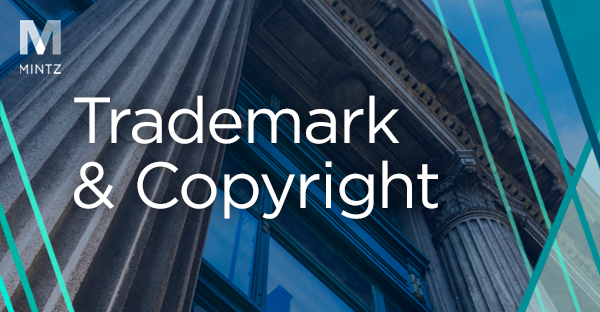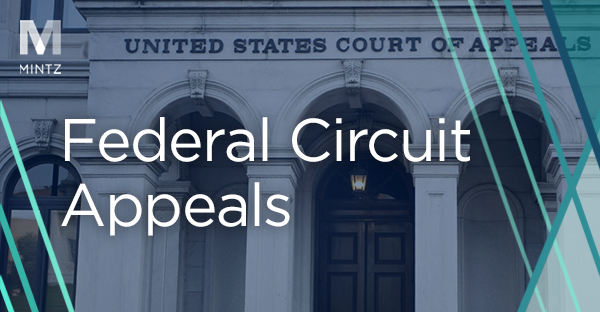
Intellectual Property
Viewpoints
Filter by:
Congress Creates a Copyright Claims Board for Adjudication of Small Copyright Infringement Claims
January 5, 2021 | Blog | By Seth Davidson
Following up on our initial report last year on the possible creation of a Copyright Claims Board, we can now confirm the creation of that Board. The Consolidated Appropriations Act signed into law by President Trump on December 27, 2020 incorporates the CASE Act, establishes this new Copyright Claims Board (CCB) within the Copyright Office.
Read more
Protecting Lawful Streaming Act Signed Into Law
January 5, 2021 | Blog | By Seth Davidson
One of the provisions included in the Consolidated Appropriations Act that President Trump signed into law on December 27, 2020 addresses the so-called “felony streaming” loophole in the Copyright Act and criminal code.
Read more
Overview of USPTO Webinar: Understanding Patenting in China
December 17, 2020 | Blog | By Christina Sperry
Patent protection in China has been a hot topic of discussion and strategy for U.S. companies. The U.S. Patent and Trademark Office (USPTO) China team within the USPTO's Office of Policy and International Affairs is a dedicated group of intellectual property (IP) attorneys and specialists with knowledge and experience on China manners from the U.S. law perspective as well as the Chinese law perspective.
Read more
FDA Issues New Guidance on Drug Naming
December 17, 2020 | Blog | By Karen K. Won
Last week, the Food and Drug Administration (“FDA”) issued a pair of Guidance for Industry documents outlining best practices for developing proprietary names (i.e. brand names) for prescription and nonprescription human drug products.
Read more
Is This Seat Taken? A Chinese IP Court Proclaims Its Authority to Declare Global FRAND Terms
December 7, 2020 | Blog | By Michael Renaud, James Wodarski, Matthew Galica
A Chinese Court recently decided that it has the willingness, and jurisdiction, to set a global licensing rate that is fair, reasonable, and non-discriminatory (“FRAND”) for standard essential patents (“SEP”).
Read more
Rise of the Improper Markush Grouping Rejection and Biomolecules
November 18, 2020 | Blog | By Marc Morley
Tip #6 for Avoiding IPR Institution: Advocate Claim Constructions the Petition Ignored
November 16, 2020 | Blog | By Daniel Weinger, Peter Cuomo
No Pleading, No Problem: Court Denies Motion to Dismiss and Bifurcates Willful Infringement Determination, in Absence of Affirmative Willful Infringement Claim
November 13, 2020 | Blog | By Adam Samansky, Peter Cuomo, Joe Rutkowski, Courtney Herndon
Recently in Nike, Inc. v. Skechers U.S.A., Inc., 2:17-cv-08509 (C.D. Cal.) (October 26, 2020), the U.S. District Court for the Central District of California granted-in-part and denied-in-part Defendant, Skechers U.S.A., Inc.’s (“Skechers”), motion to limit Plaintiff, Nike, Inc.’s (“Nike”), claim seeking attorney’s fees related to the infringement of its eight asserted design patents, resulting in the bifurcation of the willfulness issue from the trial on the merits.
Read more
Tip #5 for Avoiding IPR Institution: Policing KSR’s motivation requirement for the ‘how’ and ‘why’.
November 12, 2020 | Blog | By Peter Cuomo, Daniel Weinger
Building on Tip #4, one effective way to avoid institution and not address facts is to point out shortcomings in the petition’s application of KSR when asserting motivation to combine for an obviousness analysis. The Patent Trial and Appeal Board (“PTAB”) is an administrative tribunal that frequently encounters proposed grounds that challenged claims are obvious pursuant to 35 U.S.C. ¶103.
Read more
In Hatch-Waxman litigation, Federal Circuit restricts venue under the TC Heartland to districts relating to ANDA filings
November 12, 2020 | Blog | By Adam Samansky, Peter Cuomo, Joe Rutkowski, Nana Liu
On November 5, 2020, the United States Court of Appeals for the Federal Circuit, in Valeant Pharmaceuticals N. Am. LLC v. Mylan Pharmaceuticals Inc., No. 19-2402, resolved a split among district courts over what constitutes “acts of infringement” sufficient to support venue in the context of a Hatch-Waxman litigation.
Read more
Tip #4 for Avoiding IPR Institution: Don’t Argue Facts
November 9, 2020 | Blog | By Brad M Scheller, Serge Subach
We’ve previously written that the best defense to an IPR challenge is avoiding IPR institution altogether. In addition to the other tips discussed in this series of posts, another strategy for avoiding institution is focusing the Patent Owner’s Preliminary Response (“POPR”) on areas where the Petitioner failed to adequately support its argument.
Read more
Tip #3 for Avoiding IPR Institution: Use Disclaimers Strategically
November 5, 2020 | Blog | By William Meunier, Peter Cuomo
Under U.S. patent law, “No inter partes review will be instituted based on disclaimed claims.” 37 C.F.R. § 42.107(e). And petitioners only need to demonstrate a reasonable likelihood of prevailing with respect to one challenged claim in order to secure a favorable institution from the PTAB. 35 U.S.C. § 314.
Read more
Tip #2 for Avoiding IPR Institution: Focus on a few arguments that will affect all challenged claims
November 2, 2020 | Blog | By Michael Newman, Daniel Weinger
If you are a patent owner facing an inter partes review (“IPR”) or other post-grant review at the Patent Trial and Appeal Board (“PTAB”), your best chance of success is to convince the PTAB not to institute a trial. But that does not mean that you should pack all of your substantive arguments about patentability into your preliminary response.
Read more
U.S. Trademark Office Issues Guide on How It Will Apply the Supreme Court’s Booking.com Decision to Examination of Relevant Applications
October 29, 2020 | Blog | By Susan Neuberger Weller
As we reported in our July 7, 2020 blog post on the USPTO v. Booking.com B.V decision, the U.S. Supreme Court ruled that a proposed mark consisting of the combination of a generic term and a generic top-level domain, like “.com,” is not automatically generic and can be protected as a trademark under certain circumstances.
Read more
Tip #1 for Avoiding IPR Institution: Litigation Venue Selection
October 29, 2020 | Blog | By Daniel Weinger, Michael Newman, Peter Cuomo
Venue selection is a critical component to any patent enforcement strategy, even before the inception of the PTAB as we know it today. Venue now has even greater importance, as the speed of your patent case (i.e. time to trial) and stay statistics will have a direct impact on whether IPRs against your patents will institute in light of the Fintiv factors.
Read more
Avoiding IPR Institution: Your Best Defense to an IPR Challenge
October 27, 2020 | Blog | By Peter Cuomo, William Meunier, Brad M Scheller
The United States Patent and Trademark Office (USPTO) Patent Trial and Appeal Board (PTAB) was once famously referred to by the former chief judge of the Federal Circuit, the honorable Randall Rader, as a patent death squad.
Read more
Procuring U.S. Patents without a Signed Assignment of Patent Rights
October 27, 2020 | Blog | By Christina Sperry, Mark Hammond
Increased employee mobility, health challenges, and the economic downturn due to the COVID-19 pandemic may result in more inventors than usual being unavailable to assign patent rights. Fortunately, applicants may procure a U.S. patent even if an assignment document cannot be obtained for the application to be filed.
Read more
The Art of An SEP War: A Chinese IP Court’s Recent Use of Anti-Suit Injunction Invites A Battle that It Likely Won’t Win
October 26, 2020 | Blog | By Michael Renaud, James Wodarski, Daniel Weinger
The recent anti-suit injunction issued against InterDigital in its SEP litigation with Xiaomi is a somewhat predictable reaction to the recent UK Supreme Court decision against Huawei and ZTE. One of the central arguments there was that the UK courts were trying to set themselves up as the international arbiter of FRAND disputes.
Read more
Fate of PTAB Judges and Decisions Now in Hands of Supreme Court
October 15, 2020 | Blog | By Michael Renaud, William Meunier, Monique Winters Macek
On October 13, 2020, the U.S. Supreme Court granted three petitions for writ of certiorari related to Arthrex v. Smith & Nephew addressing two issues that will determine the fate of PTAB judges and decisions.
Read more
Recreating the Prior Art
October 7, 2020 | Blog | By Andrew D. Skale
In high-stakes litigation, parties go to great lengths to prove their case. One such example is ongoing litigation between two giants in the paint and coatings world. Sherwin-Williams Co. and PPG Industries, Inc. are involved in a patent infringement dispute over BPA-free can coatings.
Read more
Explore Other Viewpoints:
- Data Centers & Digital Infrastructure
- AI: The Washington Report
- Antitrust and Federal Regulation
- Appellate
- Arbitration, Mediation & Alternate Dispute Resolution
- Artificial Intelligence
- Awards
- Bankruptcy & Restructuring
- California Land Use
- Cannabis
- Class Action
- Complex Commercial Litigation
- Construction
- Consumer Product Safety
- Corporate Governance (ESG)
- Cross-Border Asset Recovery
- DEI Legal Developments
- Debt Financing
- Direct Investing (M&A)
- Diversity
- EB-5 Financing
- Education & Nonprofits
- Employment
- EnforceMintz
- Environmental (ESG)
- Environmental Enforcement Defense
- Environmental Law
- Environmental, Social, and Corporate Governance (ESG)
- FDA Regulatory
- FDA in Flux
- False Claims Act
- Federal Circuit Appeals
- Financial Institution Litigation
- Government Law
- Growth Equity
- Health Care
- Health Care Compliance, Fraud and Abuse, & Regulatory Counseling
- Health Care Enforcement & Investigations
- Health Care Transactions
- Health Information Privacy & Security
- IP Due Diligence
- IPRs & Other Post Grant Proceedings
- Immigration
- Impacts of a New US Administration
- Insolvency & Creditor Rights Litigation
- Institutional Investor Class Action Recovery
- Insurance & Financial Services
- Insurance Consulting & Risk Management
- Insurance and Reinsurance Problem-Solving & Dispute Resolution
- Intellectual Property
- Investment Funds
- Israel
- Licensing & Technology Transactions
- Life Sciences
- Litigation & Investigations
- M&A Litigation
- ML Strategies
- Managed Care
- Medicare, Medicaid and Commercial Coverage & Reimbursement
- Mergers & Acquisitions
- Patent Litigation
- Patent Prosecution & Strategic Counseling
- Pharmacy Benefits and PBM Contracting
- Portfolio Companies
- Privacy & Cybersecurity
- Private Client
- Private Equity
- Pro Bono
- Probate & Fiduciary Litigation
- Products Liability & Complex Tort
- Projects & Infrastructure
- Public Finance
- Real Estate Litigation
- Real Estate Transactions
- Real Estate, Construction & Infrastructure
- Retail & Consumer Products
- Securities & Capital Markets
- Securities Litigation
- Social (ESG)
- Special Purpose Acquisition Company (SPACs)
- Sports & Entertainment
- State Attorneys General
- Strategic IP Monetization & Licensing
- Sustainable Energy & Infrastructure
- Tax
- Technology
- Technology, Communications & Media
- Technology, Communications & Media Litigation
- Trade Secrets
- Trademark & Copyright
- Trademark Litigation
- Unified Patent Court (UPC)
- Value-Based Care
- Venture Capital & Emerging Companies
- White Collar Defense & Government Investigations
- Women's Health and Technology










